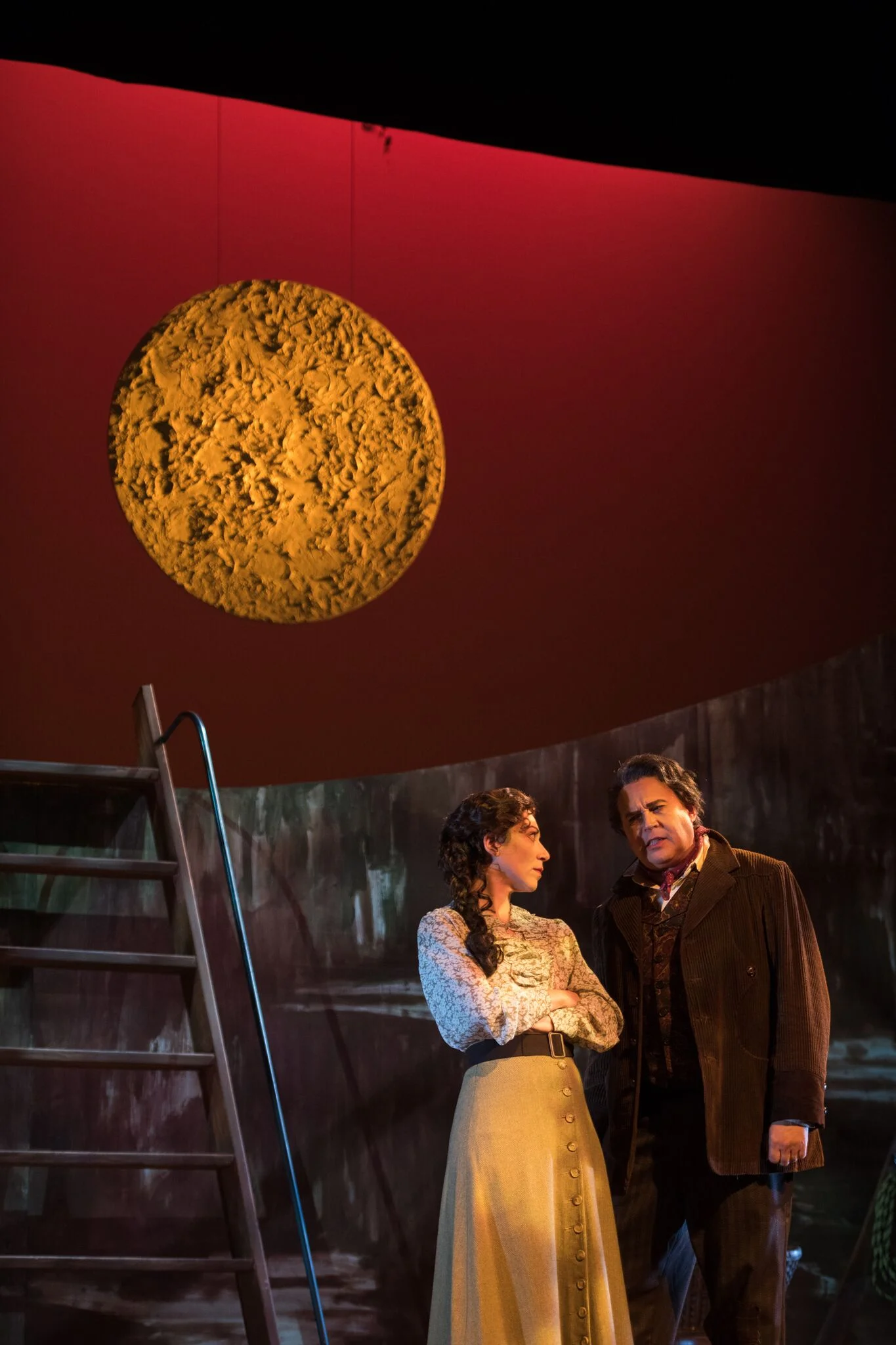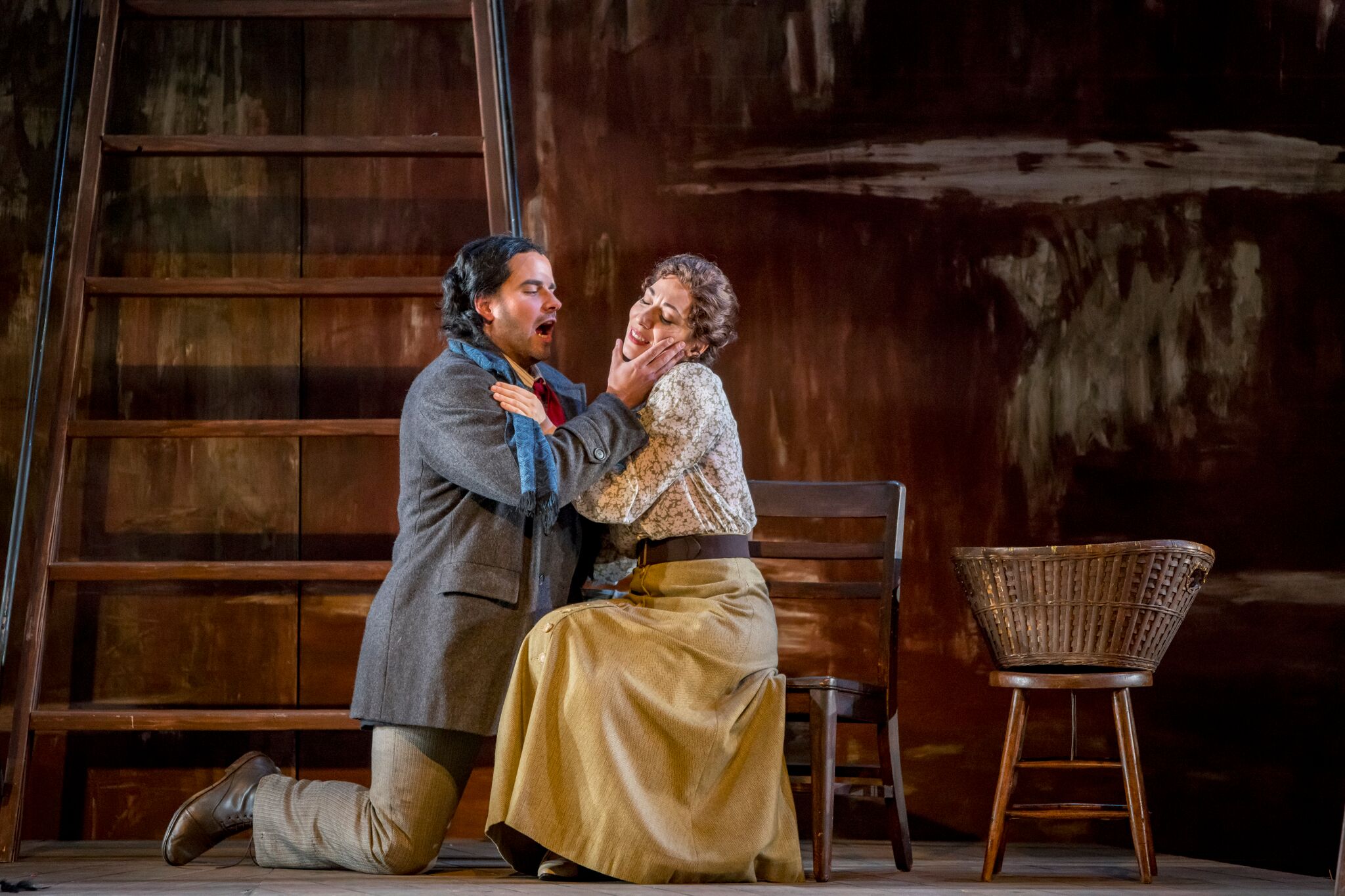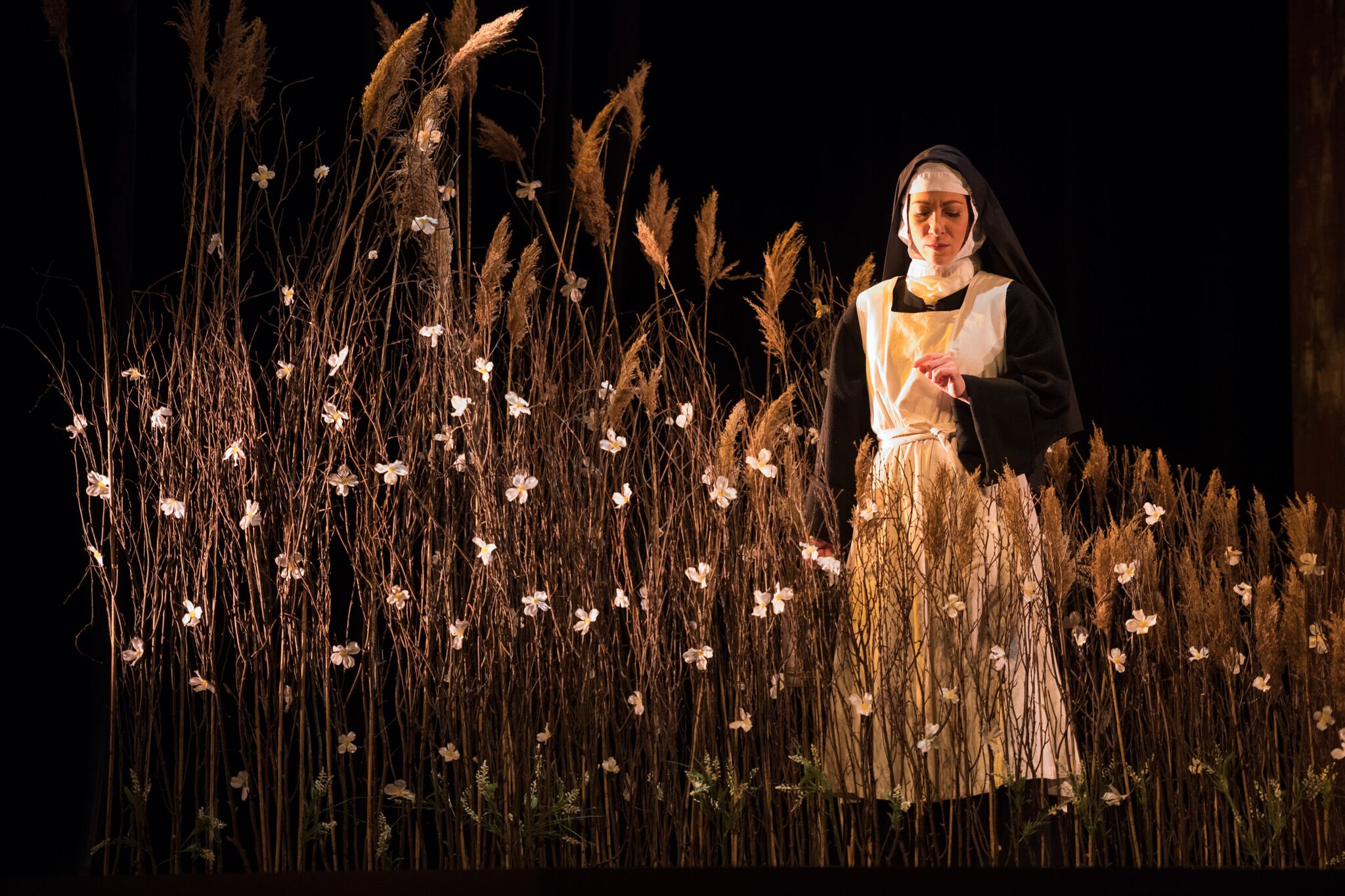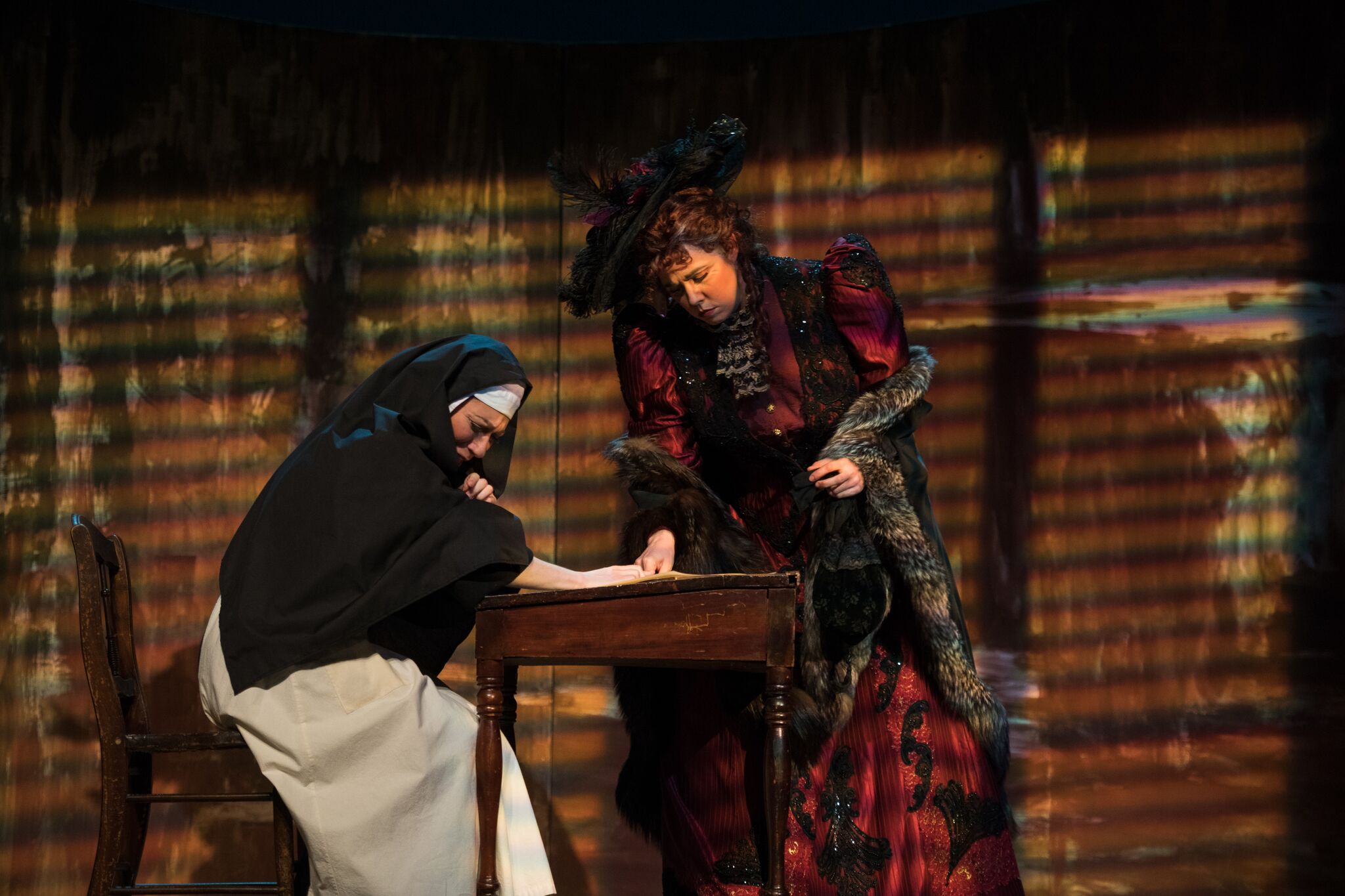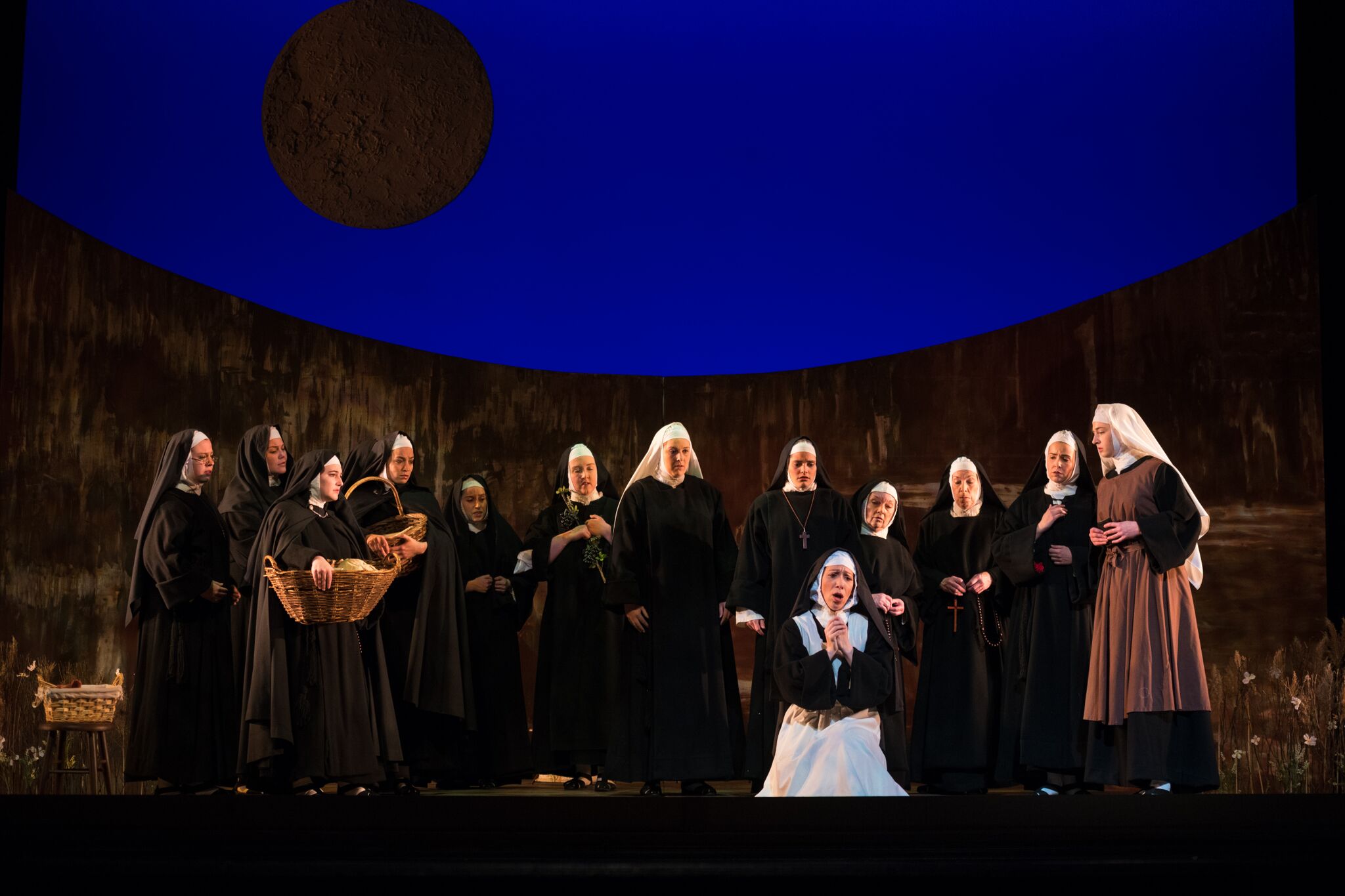Unexpected detours occur along the way when you are pursuing an interest. I recently attended Baltimore Concert Opera’s twin bill of Giacomo Puccini’s Gianni Schicchi and Michael Ching’s comedic sequel Busoso’s Ghost, productions that were headed for full staging by OperaDelaware as part of its Puccini Festival 2018. My decision to attend BCO’s performance had been made because my son and two of his friends in college had just watched a video of Schicchi and raved about what an under-appreciated comedy it is. I didn’t know much about the opera except that it had one of operas most famous arias, “O mio babbino caro”. My son’s interest piqued mine, and I offered to take him and his friends to see the BCO concert version. They accepted and were particularly looking forward to seeing Ghost for the first time. We all enjoyed the performances, and I wrote a blog report on our adventure.
Setting the mood, Il Tabarro, begins with Michele (Grant Youngblood) sitting atop his barge as the sun sets. Photos by Moonloop Photography; courtesy of OperaDelaware.
The General Director of OperaDelaware, Brendan Cooke, read the blog report and sent me a gracious invitation to attend their staged version of Schicchi in Wilmington. As it turned out, our schedules would not permit attending Schicchi, but my wife and I did make the 120-mile drive up for Saturday night’s (April 28) performances of Il Tabarro and Suor Angelica. In researching Gianni Schicchi, I had also read about Il Tabarro and Suor Angelica. All three were composed by Puccini under the heading of Il Trittico and were meant to be performed together. I have sort of ignored Il Trittico in the past. It is rarely performed as a unit these days, though the individual operas are occasionally performed as a coupling of two out of three, or singly coupled to another short opera. I guessed Il Trittico wasn’t often performed because it was not one of Puccini’s better works. Shame on me for doubting Puccini, but more on that later. It turns out that Il Trittico is not often performed as a unit because the logistical problems are huge, making it a drain on any opera company’s resources – three sets of singers are employed with little overlap; separate stage sets for the same evening are required, and the audience must be willing to take on four hours of opera at one sitting, not readily embraced by today’s fans (sadly so – kid’s stuff, if you are a fan of Wagner’s). OperaDelaware made the necessary compromise to break them up, but still gives us Puccini’s hat trick by doing so over two consecutive days, adding for interest Mr. Ching’s sequel paired with Schicchi. So, the opportunity to see the remainder of Il Trittico, with my wife’s encouragement, made the trek up I-95 a go; my wife, who has an interest in architecture, especially looked forward to visiting Opera Delaware’s venue, the Grand Opera House - well named. Now of course, I am so glad that I did not pass up this opportunity.
left: Eleni Calenos as Giorgetta and Grant Youngblood as Michele. right: Matthew Vickers as Luigi and Eleni Calenos as Giorgetta. Photos by Moonloop Photography; courtesy of OperaDelaware.
If you have hung with me this long, I won’t make you wait for the bottom line on these two members of Il Trittico – these operas as performed by OperaDelaware are excellent, small gems actually, with creative, immersive staging and wonderful singers and music; if you have not heard soprano Eleni Calenos before, head to your phone or computer and order your tickets now for the coming weekend’s performances. Having seen concert versions of Gianni Schicchi and Buoso's Ghost in Baltimore, I can recommend those productions as well, which also feature great Puccini music - and much happier outcomes.
Michele (Grant Youngblood) forces Giorgetta (Eleni Calenos) to look at Luigi's corpse (Matthew Vickers). Photos by Moonloop Photography; courtesy of OperaDelaware.
First up was Il Tabarro. A barge owner, Michele, suspects correctly that his wife Giorgetta is secretly meeting with one of the stevedores, Luigi. He catches them together on the barge at night and exacts his dreadful revenge. Puccini and his librettist Giuseppe Adami and Il Tabarro’s director Crystal Manich present Michele, Giorgetta, and Luigi as complex characters, invoking our sympathey and caring for each before the shocking denouement. There is no happy ending for this third of Il Trittico, but there is excellent acting, music, and singing. Puccini is a great master and Conductor Anthony Barrese, also OperaDelaware's Music Director, and the orchestra gave good Puccini. I thought that the music in Il Tabarro was more characterized by simple pairings of instruments to provide emotional color to the story, instead of Puccini’s sweeping string statements, although the story’s undercurrents were frequently moved along by the basses (a non-musician’s reading). Ms. Manich chose to set the chorus off stage, which worked for the drama, but not surprisingly, made them sound more distant.
I seriously thought about beginning this blog report by gushing about Ms. Calenos, but restrained myself. She had me at her first aria. She has a lovely, strong soprano voice and sings and acts well, but the remarkable thing about her is a rare quality of her voice; it is a natural for conveying pathos, a little reminiscent of that special quality that Maria Callas possessed. No wonder General Manager Cooke cast her in the lead role of Suor Angelica as well. I think her voice is more dramatic than coloratura, but if she sang the Queen of the NIght, I'm sure I'd tell Pamina to do what her mother says. I was initially not that impressed with the guys; baritone Grant Youngblood who played Michele and Matthew Vickers who played Luigi started softly, but both have strong, enjoyable voices and they soon warmed up, making a fan of me. Mr. Youngblood was especially impressive in the role of Michele, conveying his sympathetic softer side and his fearful darker one, and Mr. Vickers stood out on several arias requiring impassioned singing. The supporting cast was excellent, adding some humor and comraderie and additional professional voices to the action.
Eleni Calenos as Sister Angelica. Photos by Moonloop Photography; courtesy of OperaDelaware.
The bridge opera of Il Trittico is Suor Angelica. The action takes place mainly in a flower garden within the convent cloisters. Enter at your own risk. You don’t want to watch this story, but you can’t help it. Why can’t we all just get along. Sister Angelica was forced into the convent by her family seven years prior when she bore a son out of wedlock. She’s had no contact with her family or word about her son since entering, until she is visited by an aunt to force her to sign away an inheritance. Sister Angelica learns in brutal fashion that her son took sick and died two years ago. Her secret desire to be with her son again now only has one possible resolution: the audience must cry. So, Puccini and his librettist for this one, Giovachinno Forzano set about to make us cry: the sister takes a deadly poison and pleads with the Virgin Mary for absolution for this deadly sin and to be allowed to be with her son once more, which she and we are granted. We are a reserved people, somewhat inured to such dramatic scenes by television. As I watched, I keep thinking that if I were in the Grand Opera House in 1918, the ushers would now be mopping the floors.
left: Sister Angelica (Eleni Calenos) kneeling among the nuns. right: Sister Angelica (Eleni Calenos) and her aunt (Alissa Anderson). Photos by Moonloop Photography; courtesy of OperaDelaware.
Ms. Calenos gave another excellent performance as Sister Angelica. Playing Angelica’s abusive aunt who believes she is doing the right thing for the family, is mezzo-soprano Alissa Anderson. Ms. Anderson also played the comedic, worldly-wise role of Frugola with panache in Tabarro; Ms. Anderson was as enjoyable in that role as she was insufferable as the conflicted aunt. Several of the nuns had passages to sing and performed well, and as a group provided a beautiful chorus. Kudos to Chorus Master Aurelien Eulert.
The sets for each production were minimalist but effective. I especially like the set in Tabarro where the action takes place inside the barge. Director Manich gave a terrific pre-opera talk; a warm and animated speaker, she walked us through some of her thought processes in preparing for and staging her two pieces of Il Trittico. She pointed out that she wanted the interactions taking place inside the boat to give the feeling of being captive which each of the main players felt, each in their own way. Kudos to Steven Dobay for set design, which is particularly effective for Tabarro; the set, costumes, and staging gave the opera a La Boheme feel to me (I might change out Luigi's modern-looking blue sweater). Ms. Manich said for Suor Angelica she wanted each nun, about a dozen in all, to look different, not a flock of look-alike nuns, providing more reality to the story. Costume designer Howard Tvsi Kaplan achieved that aim with slight variations in costumes and activities for each nun; it felt real. She also talked about the important role of lighting and although it is not attention grabbing, if you pay attention to the lighting, especially in the the background, changes with the drama all evening. Certainly, the lighting for the last scene of Suor Angelica is critical and well done.
Sister Angelica (Eleni Calenos) and her son (Rex Cooke) in a non-speaking role. Photos by Moonloop Photography; courtesy of OperaDelaware.
I have recently heard three directors talking about staging operas: Kristine McIntyre said she read the novel “Moby Dick” seven times before beginning the staging of the opera ; Kyle Lang said he focused on each line of text in Lucia di Lammermoor in working out the staging, and Director Manich said she highlighted “events” in the libretto (moments when all the characters on stage were involved) for these two operas and had about a thousand events underlined for each opera, if I remember correctly. A lot of hard work by a lot of creative and dedicated people, not all named in the program, go into staging an opera, and I always feel a little guilty for only singling out a few by name for comment.
As I close, I’ve noticed that, without meaning to, my writing style moved to a more humorous approach in my description of Suor Angelica than with the earlier discussion of Il Tabarro. Perhaps to distance myself from dealing with the emotional impact of both these operas? Though the three operas of Puccini’s Il Trittico have little in common that apparently binds them (unless there is something he didn't tell us), it makes me think that maybe with Gianni Schicchi he was just trying to soften the blows.
The Grand Opera House in Wilmington, DE. Photo by Debra Rogers.
The Fan Experience: The Grand Opera House is worth a visit by itself. Attractive on the outside and inside, and on the inside, it transports you into the late eighteenth/early nineteenth centuries. It is as good a venue for Puccini as you are likely to find. There are many fine restaurants close to the opera house, some less than a mile away with river views. There are several hotels close by. We stayed at the Courtyard Marriott, entirely satisfactory with free parking in an adjacent garage, and walked to the opera. If you are in the mood for luxury, the historic Hotel Dupont is only three blocks from the opera house. The drive from Tysons Corner, VA using mostly I-95 took about 2 hours in moderate traffic; having EZ pass for the toll gates is recommended.
Gianni Schicchi/Buoso’s Ghost will show again on Saturday May 5 at 7:30 pm and Il Tabarro/Suor Angelica will be on Sunday May 6 at 2 pm. Tickets range from $29 to $99 and there are good seats for both performances. A third feature of the Puccini Festival are performances of Puccini arias on May 3 and 4, called A Flight of Puccini and paired with an optional wine tasting; these are sold out, but there is a waiting list.


